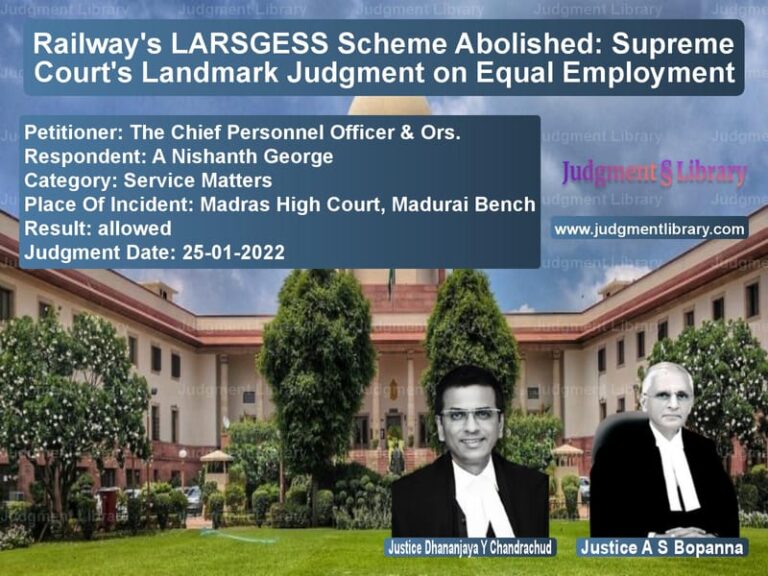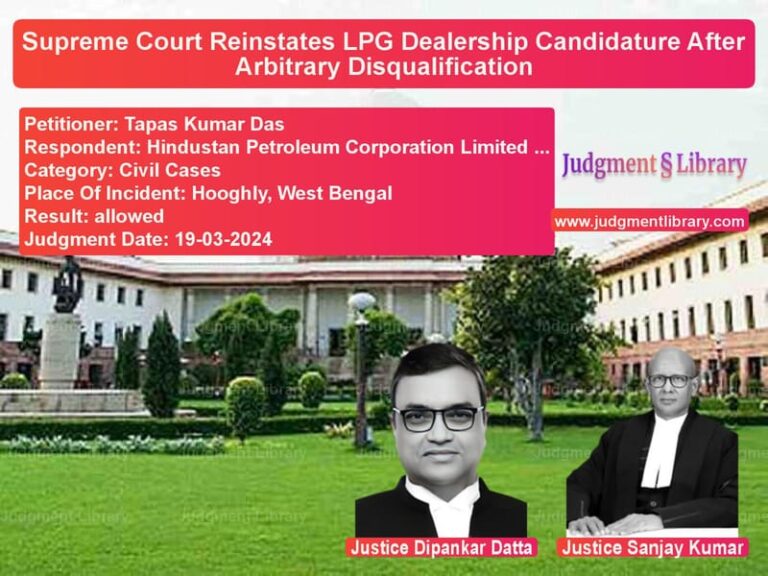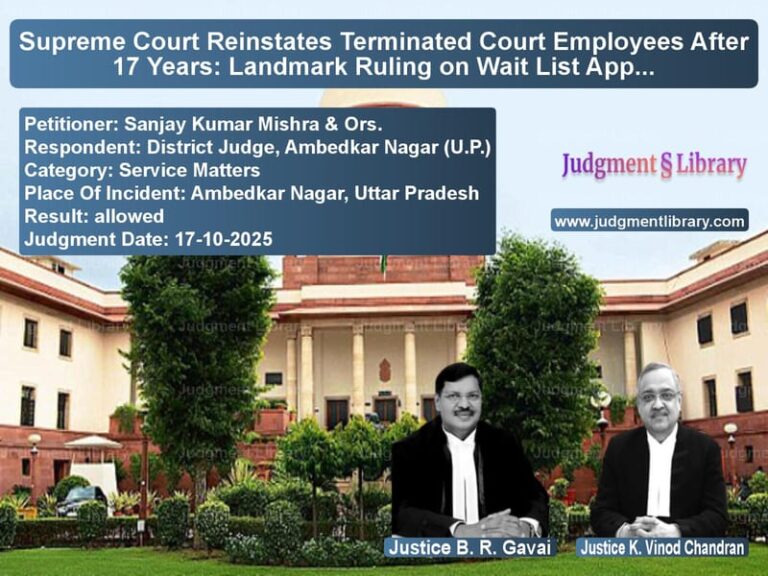Moratorium on Pharmacy College Openings: A Case Study of Pharmacy Council of India v. Rajeev College of Pharmacy
The case of Pharmacy Council of India v. Rajeev College of Pharmacy and Others revolves around the legal challenge to the imposition of a moratorium by the Pharmacy Council of India (PCI) on the establishment of new pharmacy colleges offering both diploma and degree courses. The moratorium, introduced in 2019, was intended to control the rapid increase of pharmacy colleges in India, but it was met with resistance from various educational institutions, including the respondent, Rajeev College of Pharmacy, which sought judicial intervention. The case addresses key issues such as the right of educational institutions to establish new courses, the powers of the PCI to impose such restrictions, and the balance between public policy and individual rights under the Constitution. This blog post delves into the arguments, judicial reasoning, and final judgment, shedding light on the role of regulatory bodies in education and their authority to enforce restrictions in the public interest.
Background of the Case
The Pharmacy Council of India (PCI) imposed a moratorium on the opening of new pharmacy colleges for a period of five years starting from the academic year 2020-2021, through its Resolution dated 17th July 2019. This decision was aimed at curbing the excessive number of pharmacy colleges being opened in the country, many of which were producing graduates with limited job prospects in the pharmaceutical industry. The moratorium was further modified on 9th September 2019, exempting certain categories of institutions, including government institutions, institutions in the North Eastern region, and states/territories with fewer than 50 pharmacy institutions. Educational institutions such as Rajeev College of Pharmacy filed writ petitions challenging the validity of this moratorium, claiming that it violated their fundamental right to establish educational institutions under Article 19(1)(g) of the Constitution of India. The matter was heard by the High Courts of Karnataka, Delhi, and Chhattisgarh, which ruled in favor of the respondent institutions, striking down the moratorium. The Pharmacy Council of India appealed these judgments before the Supreme Court.
Petitioner’s Arguments
The appellant, Pharmacy Council of India, raised several points in support of its decision to impose the moratorium:
- Regulatory Powers of PCI: The appellant argued that under the Pharmacy Act, 1948, the PCI is empowered to regulate pharmacy education in the country. It claimed that regulating the number of pharmacy colleges was within its remit to ensure that the quality of education was not compromised due to an oversupply of institutions.
- Moratorium in Public Interest: The appellant submitted that the imposition of the moratorium was in the larger public interest. The rapid growth of pharmacy colleges had resulted in a significant number of graduates without job opportunities, and the PCI had to regulate this issue to avoid further employment crises in the pharmaceutical sector.
- Constitutional and Statutory Authority: The appellant argued that the moratorium was a regulatory measure taken in exercise of its powers under the Pharmacy Act, 1948. It further contended that such measures were permissible under Article 19(6) of the Constitution, which allows reasonable restrictions on the right to establish educational institutions in the public interest.
- Precedents Supporting Moratoriums: The appellant cited several previous decisions, including those in the Jawaharlal Nehru Technological University Registrar case, where this Court had upheld the imposition of similar moratoriums by regulatory bodies in the education sector to prevent a surplus of institutions.
Respondent’s Arguments
The respondent, Rajeev College of Pharmacy, presented the following counterarguments to challenge the moratorium:
- Fundamental Right to Establish Institutions: The respondent argued that the right to establish educational institutions is a fundamental right guaranteed under Article 19(1)(g) of the Constitution of India. They claimed that the moratorium violated this right and that any restriction must be based on a law enacted by the legislature, not by an executive resolution.
- Arbitrary and Discriminatory Moratorium: The respondent contended that the moratorium was arbitrary and discriminatory. They highlighted the fact that government institutions and institutions in certain regions were exempted from the moratorium, which created an unfair advantage for those institutions. The imposition of a uniform cap on the number of institutions in all states was also criticized for being unreasonable, especially given the disparities in population and educational demand between states.
- Lack of Consultation with Stakeholders: The respondent argued that the decision to impose the moratorium was made without adequate consultation with the affected stakeholders, including educational institutions and the public. They claimed that the PCI did not conduct any studies or surveys to justify the moratorium and that no evidence was presented to support the need for such a drastic measure.
- Failure to Follow the Law: The respondent contended that the PCI’s resolution was not a law and could not be imposed as a blanket ban. They argued that if such restrictions were necessary, they should have been enacted through a statutory process, involving regulations formulated under the Pharmacy Act, 1948, and not through an executive resolution.
The Court’s Reasoning
The Supreme Court, after considering the submissions from both parties, arrived at the following conclusions:
- Fundamental Right to Establish Institutions: The Court affirmed that the right to establish educational institutions is indeed a fundamental right under Article 19(1)(g) of the Constitution. However, the Court noted that this right is subject to reasonable restrictions in the interest of the general public.
- Regulatory Authority of PCI: The Court recognized that the Pharmacy Council of India has a legitimate role in regulating pharmacy education in the country. The Court acknowledged that regulating the number of pharmacy institutions could be justified in certain circumstances, particularly to avoid a surplus of institutions that could lead to poor quality education and high unemployment rates among graduates.
- Moratorium as an Executive Decision: The Court held that while the PCI has the authority to regulate education in the pharmacy sector, the imposition of a moratorium by a mere executive resolution was problematic. The Court concluded that such significant restrictions on the establishment of educational institutions should not be imposed by an executive body without legislative backing or regulatory measures being enacted through the proper statutory process.
- Discriminatory Nature of the Moratorium: The Court also criticized the discriminatory nature of the moratorium, particularly the exemptions for government institutions and institutions in certain regions. The Court found that such exemptions created an uneven playing field, violating the principle of equality before the law under Article 14 of the Constitution.
- Need for a Legislative Framework: The Court emphasized that if the PCI wished to impose such restrictions, it should have done so through a legislative or regulatory framework that complies with the constitutional requirements. The imposition of a blanket moratorium by executive action was deemed to be in violation of the constitutional provisions.
The Court’s Decision
The Supreme Court made the following orders:
- Dismissal of the Appeal: The Court dismissed the appeal filed by the Pharmacy Council of India, upholding the judgments of the High Courts of Karnataka, Delhi, and Chhattisgarh that had struck down the moratorium imposed by the PCI.
- Moratorium Not Valid: The Court declared that the moratorium imposed by the PCI through executive resolution was not valid and had to be set aside. The Court emphasized that such restrictions on the establishment of educational institutions must be based on law and cannot be imposed by mere executive instructions.
- Consideration of Stakeholder Inputs: The Court directed the PCI to consider the views of stakeholders and follow a transparent and participatory process if it wished to impose any future restrictions on the establishment of pharmacy institutions.
- No Order as to Costs: The Court made no order as to costs, given the constitutional nature of the case and the importance of the issues involved.
Conclusion
This case underscores the delicate balance between regulating education and protecting fundamental rights under the Constitution. The Supreme Court’s judgment clarifies that while regulatory bodies like the PCI have significant authority, such powers cannot be exercised arbitrarily through executive resolutions. If the PCI wishes to impose restrictions on pharmacy colleges, it must do so through a legally sanctioned process, respecting the rights of individuals and institutions. The decision also highlights the importance of fairness and non-discrimination in regulatory measures that impact educational institutions.
Petitioner Name: Pharmacy Council of India.Respondent Name: Rajeev College of Pharmacy and Ors..Judgment By: Justice B.R. Gavai, Justice Pamidighantam Sri Narasimha.Place Of Incident: India.Judgment Date: 15-09-2022.
Don’t miss out on the full details! Download the complete judgment in PDF format below and gain valuable insights instantly!
Download Judgment: pharmacy-council-of-vs-rajeev-college-of-ph-supreme-court-of-india-judgment-dated-15-09-2022.pdf
Directly Download Judgment: Directly download this Judgment
See all petitions in Fundamental Rights
See all petitions in Legislative Powers
See all petitions in Public Interest Litigation
See all petitions in Separation of Powers
See all petitions in Judgment by B R Gavai
See all petitions in Judgment by P.S. Narasimha
See all petitions in dismissed
See all petitions in supreme court of India judgments September 2022
See all petitions in 2022 judgments
See all posts in Constitutional Cases Category
See all allowed petitions in Constitutional Cases Category
See all Dismissed petitions in Constitutional Cases Category
See all partially allowed petitions in Constitutional Cases Category







